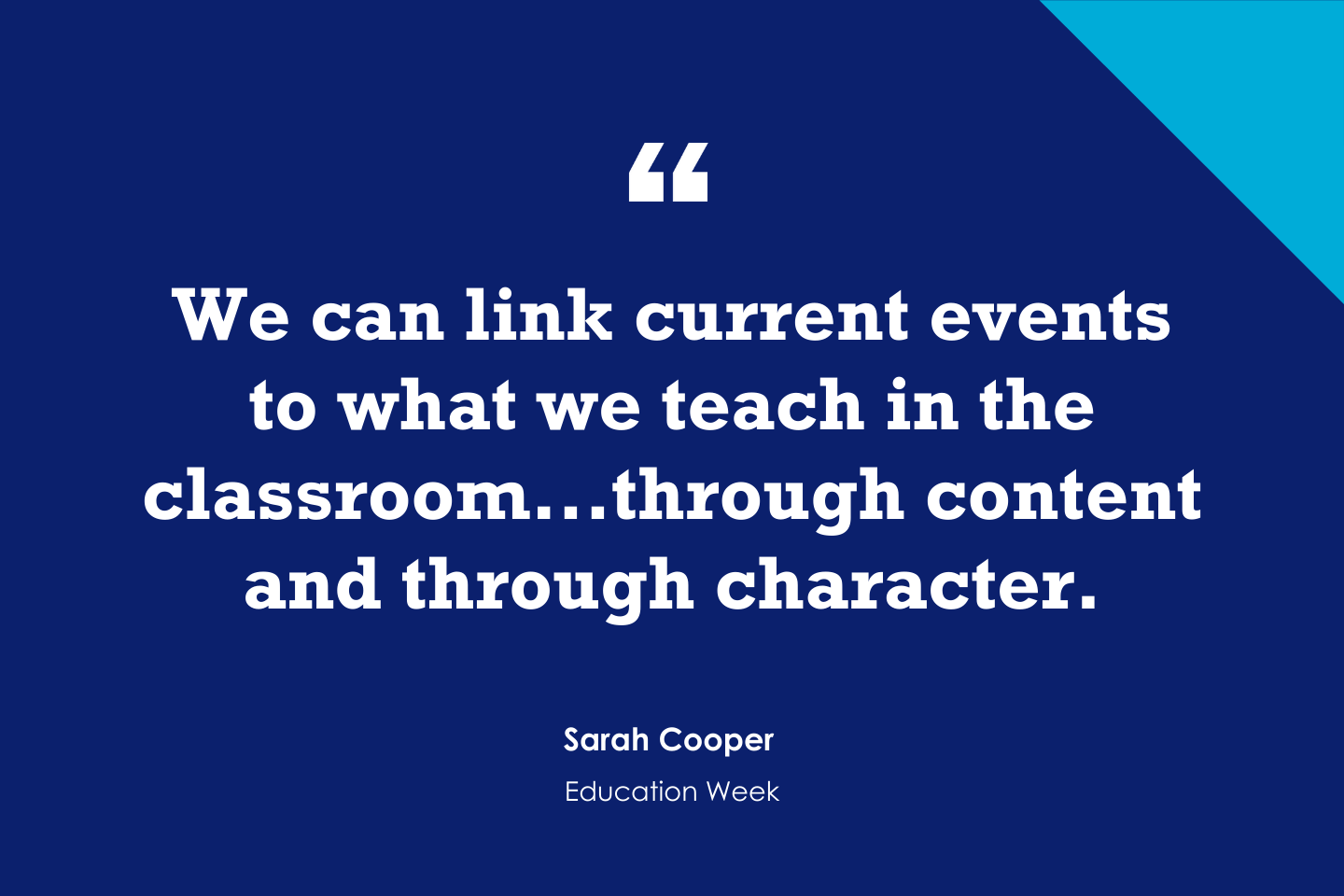
As regular readers know, I’ve been doing the Classroom Q&A column over at Education Week for thirteen years.
And I plan to continue doing it for quite a few more years.
I have so many contributors now, though, that there really isn’t space there for my annual thematic compilation posts, where I collect links to all the posts on particular topics.
So, I’m starting to do it here instead.
Today’s theme is on Social Studies:
Social Studies Teachers May Have Some Difficult Choices to Make. These Ideas Could Help
Here’s one way to turn the fire hose of news into meaningful classroom discussions of current events.
Don’t Suffocate Students With Memorization. Get Them Talking
When it comes to social studies instruction, teaching students how to develop ideas by talking about them is critical.
Mock Trials? Debates? Here’s a Better Way to Approach Supreme Court Decisions in Class
8 Practical Ideas for Teaching Social Studies in Culturally Responsive Ways
18 Ways to Make Social Studies Class More Culturally Responsive
Teaching About Slavery in the United States? Start With Honesty
Strategies have to include teachers acknowledging what they don’t know and recognizing they have to convey some ugly truths. Read more.
Strategies for Using Art in Math, English, Science, and History
Employing art to explore geometric patterns and to scaffold essay writing are among the ways educators can use art in their classes. Read more.
Introducing Primary Sources to Students
Five educators share strategies for introducing primary sources to students, including English-language learners. Read more.
Eight Ways to Teach With Primary Sources
Four educators share ways they use primary sources with students, including a strategy called “Zoom,” and I don’t mean the meeting platform. Read more.
‘Standing Up for What Is Right’: Teaching in the Aftermath of the Presidential Election
Four teachers explain how they are handling this year’s—2020—presidential election in their classrooms. Read more.
Post-Election Teaching Strategies
Four teachers share suggestions for lessons following the 2020 election, including focusing on local issues and practicing media literacy. Read more.
Readers Respond: Should Politics Be Kept Out of the Classroom?
Many readers share their responses to the question of politics in the classroom, ranging from the importance of separating it from “partisanship” to stating that “teaching is political.” Read more.
‘Keeping Politics Out of the Classroom Is Like Keeping the Water Out of Rain’
Four educators consider how to explore politics in the classroom, including by incorporating multiple perspectives and ensuring all student voices are heard. Read more.
Politics Belongs in the Classroom
Four educators discuss the importance of bringing politics into the classroom, including to help students develop skills in discourse and information literacy. Read more.
‘Classrooms Are Political’
Four educators push back against the admonition to “keep politics out of the classroom” by, among other things, explaining that schools are part of a broader political system. Read more.
*Ways to ‘Break Down Walls Between Classroom & Community’
Three educators share ways to connect their students to community engagement, including through project-based learning and community-service projects.
*Three Ways to Bring the Classroom to the Community
Four teachers share their strategies to help students improve their communities, including through “Structured Academic Controversies” and “Genius Hours.”
*Adapting Social Studies for Remote Teaching
Three social studies teachers share the instructional strategies they are using in distance learning, including project-based learning and various online tools.
*Social Studies Instruction in the Age of the Coronavirus
Five social studies teachers discuss their online instructional strategies, including emphasizing relevancy and maintaining high standards.
*Making Current Events Connections to Lessons
Seven educators discuss multiple ways to bridge current events with their classroom lessons, including applying learning transfer and information-literacy strategies.
*Seven Ways to Bring Current Events Into the Classroom
Project-based learning and student-created podcasts are among the techniques six educators employ to bring current events into the classroom and engage students.
*The Best Social Studies Lesson Is When History Comes ‘Alive’
Carina Whiteside, Denise Fawcett Facey, Deborah Gatrell, and Mark Honeyman discuss what they think were their best social studies lessons that connected with their students.
*It’s a Great Lesson When Students ‘Want to Continue Their Own Learning’
This two-part series on best social studies lessons is “wrapped up” today by commentaries from Rachel Johnson, Dawn Mitchell, Julie Stern, Cynthia W. Resor, Andrew Sharos, Lori Oczkus, and Keisha Rembert.
*Ways to Strengthen Students’ Information-Literacy Skills
A series on teaching information literacy to students finishes up with suggestions from Elliott Rebhun, Dr. Laura Greenstein, Michael Fisher, Dr. Barbara R. Blackburn, and Douglas Reeves.
*’We Need to Teach Our Students to Be Smart Consumers of Information’
Carla Truttman, Josh Perlman, Jennifer Casa-Todd, Bryan Goodwin, and Frank W. Baker share their suggestions for information-literacy lessons.
* ‘Students Need to DO History, Not Just Listen to it’
Big mistakes are made in social studies instruction. What can teachers do to avoid them? Annie Brown, Amy Okimoto, Amy Fast, Lynette Yorgason, Mike Kaechele, and Dr. Rebecca Testa-Ryan weigh in.
* Ways to Use Tech in Social Studies Classes
Sarah Cooper and Ken Halla share suggestions on how to use tech in social studies classes.
* ‘We Should Embrace Writing in Social Studies’
Martha Sevetson Rush, Andrew Miller, Melissa Miles, Donna L. Shrum, and Richard Byrne contribute their thoughts on writing in social studies classes.
* Ways to Integrate Writing in Social Studies Classes
Stan Pesick, Ben Alvord, Dawn Mitchell, Rachel Johnson, and Rebecca Testa-Ryan share their suggestions on integrating writing into social studies classes.
* Helping Students ‘Get Into History’
Diana Laufenberg, Sarah Cooper, Chris Hulleman, Suzie Boss, and Erin Brandvold discuss how we can make social studies lessons more exciting!
* Social Studies Is ‘About Creating Skilled Inquirers’
Andrew Kozlowsky, Stephanie Smith, Greg Milo, Dr. Donna Wilson, Marcus Conyers, Andrew Miller, and Tamara Fyke contribute their ideas on how to make social studies lessons more engaging.
* Common Core Moves Social Studies From ‘Memorization’ to a ‘Meaningful Place’
Sarah Cooper, Michael Fisher, Ruchi Agarwal-Rangnath, Jody Passanisi, and Eugenia Mora-Flores share their thoughts on the impact of the Common Core State Standards on social studies classrooms.
* Common Core in Social Studies Looks Like ‘the Work of Historians’
Jennifer Hesseltine, Kenny McKee, Erik M. Francis, Wayne Journell, and Dave Stuart Jr. contribute their ideas about the social studies connection to the Common Core State Standards.
* Teachers Lose ‘Credibility’ If We Don’t Address ‘Controversial’ Topics
Lorena Germán, Adeyemi Stembridge, Stephen Lazar, Jen Schwanke, and Aubrie Rojee share their ideas on how to handle so-called “controversial” topics in the classroom.
* ‘Fear’ Should Not Stop Us From Exploring ‘Controversial’ Topics in School
Gabriella Corales, Tom Rademacher, Martha Caldwell, Oman Frame, Danny Woo, Paul Barnwell, and Kathleen Neagle Sokolowski share their responses to the question: “How do you handle controversial issues in the classroom?”
* Teachers Should Examine ‘Biases’ When Discussing ‘Sensitive’ Topics
Dominique Williams, Matthew Homrich-Knieling, Meg White, Kristina J. Doubet, Jessica A. Hockett, Vance Austin, and Stephanie Smith contribute to Part Three in a series on handling “controversial” issues in the classroom.
* ‘Don’t Avoid Controversial Topics’ in School
Today’s answers on dealing with controversial issues in the classroom are provided by Sara Ahmed, Jennifer Borgioli, Kevin Scott, Erik M. Francis, Phil Hunsberger, Jackie Walsh, Beth Sattes, and Dave Stuart Jr.
* It’s ‘Vital’ for Teachers to ‘Integrate Controversial Topics Into Lessons’
A five-part series on handling controversial topics in the classroom is wrapped up with commentaries by Meg Riordan, Lymaris Santana, Sarah Thomas, and Thomas Armstrong, along with many comments from readers.
* Ways Principals Can Assist Social Studies Teachers
Troy Hicks, Kristina J. Doubet, David Sherrin, Kirke Olson, and Barbara Blackburn share their thoughts. I’ve also included comments from many readers.
* ‘Doing’ Geography Instead of ‘Studying’ It
Today’s guest responses come from Kelly Young, from whom I’ve learned more about teaching than from anyone else; Elisabeth Johnson, who is the best social studies teacher I’ve ever seen; middle school educator Lisa Butler; and Matt Podbury, who teaches geography at an International School in France.
* Engaging With Race and Class in the Classroom
Three educators—Ashanti Foster, Melissa Bollow Tempel, and P. L. Thomas—and a number of readers share their thoughts on this challenge.
Four educators—John T. Spencer, Diana Laufenberg, Jennifer D. Klein, and Jason Flom—respond to this issue.
* Teaching History by Encouraging Curiosity
Educators Diana Laufenberg, Sarah Kirby-Gonzalez, and Peter Pappas contributed their responses to this piece.
* Teaching History by Not Giving ‘the Answers’
Bruce Lesh, PJ Caposey, and Dave Orphal share their thoughts in this post, and I’ve also included comments from readers.
* Ways to Deal With ‘History Myths’ in the Classroom
Three talented and experienced educators share their thoughts on the topic—Stephen Lazar, ReLeah Cossett Lent, and Bill Bigelow.
* Ed Week Readers’ Ideas on How We Can Teach Social Studies More Effectively
Many readers and I contribute our suggestions.
* Additional Ways We Can Teach Social Studies More Effectively—Part Two
Social studies teachers Eric Langhorst, Beth Sanders, and Russel Tarr all write about what they’ve learned from experience.
* Several Ways We Can Teach Social Studies More Effectively—Part One
This post includes guest responses from three talented and experienced educators: Stephen Lazar, Bill Bigelow, and Sarah Kirby-Gonzalez.
As regular readers know, I’ve been doing the Classroom Q&A column over at Education Week for thirteen years. And I plan to continue doing it for quite a few more years. I have so many contributors now, though, that there really isn’t space there for my annual thematic compilation posts, where I collect links Ed Week Teacher Larry Ferlazzo’s Websites of the Day…




